This monthly newsletter is issued at a time of continuing tragedies and rising violence on our region. We deplore all forms of violence and mourn together for the so many innocent lives lost. Our response is to pledge to double our efforts yet again in the search for regional peace, justice and sustainability.
———————————————————————————————————————————————————————————————————————–
Conference on The Gaza Water and Sanitation Crisis – postponed
Due to the tragic circumstances in the region, FoEME’s conference on the Gaza Water and Sanitation Crisis has been rescheduled. Please save the new date, the afternoon of September 8th. A formal invitation will be sent in the coming weeks.
———————————————————————————————————————————————————————————————————————–
Cross Border Farmers Tour
Farmers and Mayors from Jordan and Palestine participated in a study tour in Israel to learn from the experience of waste water treatment and reuse in agriculture in Israel. The tour began at the experimental site of the South Farmers Association in Kibbutz Revadim, where detailed 
\explanations were given to the group by Joon Zilberman, a senior guide from the Israeli Ministry of Agriculture’s professional guiding service (SHAHAM). At the experimental site, we witnessed the positive results of irrigating corn with treated waste water as well as the use of compost from the waste water treatment plant’s sludge.
 The delegation also visited the Shafdan – the largest sewage treatment plant in the Middle East. The Shafdan serves a population of 2 million people in the greater Tel-Aviv Area, receiving 380,000 cm of municipal waste water daily that undergoes 4 stages of treatment to a potable water standard. The recycled water is pumped and transferred for unrestricted irrigation of all kind of crops, including vegetables, which are exported to Europe under the strict regulation and inspection of the Ministries of Health, Min. of Environment and the EU food import standards. The study tour is part of the Implementation plans of FoEME’s “Protecting Ground Water” project, aiming to teach the best available and safe practices of the reuse of treated waste water so as to alleviate pollution of groundwater. Read more in this blog
The delegation also visited the Shafdan – the largest sewage treatment plant in the Middle East. The Shafdan serves a population of 2 million people in the greater Tel-Aviv Area, receiving 380,000 cm of municipal waste water daily that undergoes 4 stages of treatment to a potable water standard. The recycled water is pumped and transferred for unrestricted irrigation of all kind of crops, including vegetables, which are exported to Europe under the strict regulation and inspection of the Ministries of Health, Min. of Environment and the EU food import standards. The study tour is part of the Implementation plans of FoEME’s “Protecting Ground Water” project, aiming to teach the best available and safe practices of the reuse of treated waste water so as to alleviate pollution of groundwater. Read more in this blog
The “Protecting Ground Water” project is supported by the European Union’s ENPI CBC Mediterranean Sea Basin Program.
———————————————————————————————————————————————————————————————————————–
Mayors from Israel and Jordan sign on a Memorandum of Understanding for a cross border project
A new unique agricultural research cooperation project, a “Model Farm”, was signed this month between the Tamar Regional Council in Israel and South Ghor in Jordan. Developed in the context of FoEME’s Good Water Neighbors “Priority Initiatives” program, the Model Farm will serve as a 
center for cross border knowledge sharing regarding different aspects of crop selection and cultivation practices such as irrigation, fertilization, and plant protection.
The Model Farm will also be a venue for cross border training programs that target local farmers and aim at improving the sustainability and profitability of the local agricultural sector in addition to tackling and solving environmental problems such as house flies that pose a terrible nuisance, but also a health threat, to the residents of the region.
Read more in our press release, in this blog, and in this Jerusalem Post article
———————————————————————————————————————————————————————————————————————–
Regional Youth Campaign Camp
 This month, a three-day cross border youth gathering took place in the north of Israel that included youth from the Jordanian, Palestinian and
This month, a three-day cross border youth gathering took place in the north of Israel that included youth from the Jordanian, Palestinian and
Israeli communities of the Good Water Neighbors project. With the expansion of the Good Water Neighbors project – from “cross border communities” – to the new “Water Basin” approach – FoEME is already utilizing the young energy of Water Trustee Alumni, several of whom joined the camp as assistants to the staff.
Youth were introduced to the “Water Cannot Wait” campaign and then participated in workshops where they learned how to make a “product” aimed to promote the Water Cannot Wait message, using easy and readily available technologies (i.e. video and recording mechanisms on smartphones). Outdoor Training (ODT) exercises, and bike rides to nearby water resources were also part of the agenda. Youth left the camp with a positive learning experience – on how to lead a joint environmental campaign – and with some new friends!
———————————————————————————————————————————————————————————————————————–
Battir Terraced Landscape listed as a UNESCO World Heritage Site
 FoEME is very glad to report that after many years of relentless work towards protecting the beautiful terraced landscape of Battir, UNESCO registered Battir as a World Heritage site in danger. FoEME now awaits the decision of the High Court of Israel as to whether the court will prevent the building of the Separation Barrier and accept FoEME’s petition that there are alternative means to maintain security without destroying what is officially, as of now, a site of World Heritage to all of humanity. FoEME congratulates the Battir Village Council, our “Good Water Neighbor” communities, local Palestinian and Israeli activists, our staff and our many supporters for this UNESCO listing.
FoEME is very glad to report that after many years of relentless work towards protecting the beautiful terraced landscape of Battir, UNESCO registered Battir as a World Heritage site in danger. FoEME now awaits the decision of the High Court of Israel as to whether the court will prevent the building of the Separation Barrier and accept FoEME’s petition that there are alternative means to maintain security without destroying what is officially, as of now, a site of World Heritage to all of humanity. FoEME congratulates the Battir Village Council, our “Good Water Neighbor” communities, local Palestinian and Israeli activists, our staff and our many supporters for this UNESCO listing.
In honor of the listing, FoEME gathered together local activists and members of the Battir village council who, at this difficult moment of continued violence in the region, exemplified how Battir remains a ray of hope for cooperation between Israelis and Palestinians towards a better future.
Read several articles written on the subject in our Good Water Neighbors / Press coverage page.
———————————————————————————————————————————————————————————————————————-
Public March in Baka el Garbia community in Israel – youth and adults grass roots call for the rehabilitation of Wadi Abu Nar
On the 26th of June, environmental activists and local schools conducted a symbolic march on the banks of Wadi Abu Nar – a polluted stream that flows from Palestine (Baka el Sharkia community) into Israel and then joins the Hadera stream which flows into the Mediterranean Sea.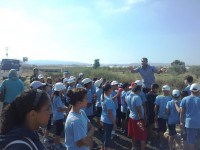
The march started on the point where the Wadi crosses the Separation Barrier in order to emphasize the cross border nature of this environmental problem. FoEME’s local community coordinator presented the Wadi’s condition and the steps needed for its rehabilitation. The march ended in a small event at the ‘El Qasami’ college, where a short film presenting the joint activities of FoEME, local residents and the local authority, was presented.
The “Good Water Neighbors” project is funded by the Swedish International Development Agency (SIDA) and the German Federal Ministry for Economic Cooperation and Development (BMZ).
———————————————————————————————————————————————————————————————————————
FoEME’s “Green Economy Initiatives” project gathered together the 3 newly hired business consultants – Israeli, Palestinian and Jordanian – at FoEME’s Sharhabil Bin Hassneh EcoPark to review together their first ‘mapping and surveying’ task. This includes identifying the many local “green economy” businesses that already exist, after which we will meet again, to choose the most appropriate businesses for participation in regional 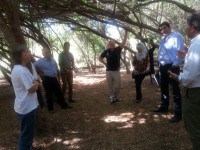 seminars aimed to promote cross border business opportunities and partnerships.
seminars aimed to promote cross border business opportunities and partnerships.
The group also received a tour and short history about the development of the EcoPark, where many of the project’s “one day youth seminars” are also held, teaching environmental awareness, regional cooperation, and “green economy” concepts.
FoEME’s “Green Economy Initiatives” project is supported by USAID Conflict Management & Mitigation Program.
———————————————————————————————————————————————————————————————————————-
FoEME at the “Bet Lahem Live Festival”
Representatives from FoEME participated in the “Bet Lahem Live Festival” that lasted from 19th till the 22nd of June 2014 to advocate for the Rehabilitation of the Jordan River. The festival marked the beginning of a global movement for peace, exploring the intersections of Faith, Culture, and Justice at the community and global levels.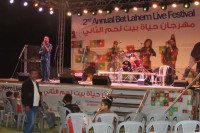
The event that took place in Bethlehem’s Old City included concerts, dance performances, faith panels, theater, workshops, a market place and social justice bazaar during which FoEME distributed brochures and educated the attendees about our Faith-based campaign launched to garner religious leaders’ support towards the rehabilitation of the Jordan River.
———————————————————————————————————————————————————————————————————————–
Regional Interfaith Jordan River Study Tour
The FoEME team hosted a two day regional inter-faith Jordan River study tour aimed to educate and empower Jewish, Christian and Muslim  community leaders in championing the rehabilitation of the Jordan River. The tour proved a transformational experience for the participants. Many of the leaders committed to raising this issue in their communities and advocate to their leadership to speak out in support of the river’s rehabilitation as both an issue of environmental importance and a way of learning about other traditions and getting to know neighboring communities.
community leaders in championing the rehabilitation of the Jordan River. The tour proved a transformational experience for the participants. Many of the leaders committed to raising this issue in their communities and advocate to their leadership to speak out in support of the river’s rehabilitation as both an issue of environmental importance and a way of learning about other traditions and getting to know neighboring communities.
In the tour’s closing reflections Rev. Samer Azar, of the Lutheran Church in Amman, commented “we as faith leaders have a moral responsibly to use our pulpits to raise awareness about the need to rehabilitate the Lower Jordan River – we must act.” At the study tour’s conclusion participants were pleased to endorse the Covenant for the Jordan River – adding their voices to other faith leaders from the region and around the world calling on political decision makers to prioritize the rehabilitation of the Jordan River.
———————————————————————————————————————————————————————————————————————-
FoEME Hosts University of Colorado Study Abroad Program at the Auja EcoCenter
FoEME team members led University of Colorado at Boulder students on a one day study tour in the Jordan River Valley focusing on how the environment and sustainable transboundary water management is being held hostage to the ongoing conflict in the region.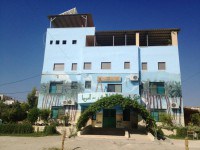
Spotlighting the community of Auja and FoEME’s widespread environmental education and advocacy programs in the area, the FoEME team led students on a site tour of the Kaser el Yehud baptism site at the Jordan River, on a hike along the Auja Spring, and hosted the students at the Auja EcoCenter for lunch, lectures and discussions about the issue. The faculty leader, Professor Jamie Polliard, Assistant Director of the Program in Jewish Studies, wrote “It was a breakthrough moment for many of our students. They will never forget the day with FoEME”.
FoEME’s Jordan River Rehabilitation Project, including the faith-based activities, are supported by the Swedish International Development Agency and the Osprey Foundation.
———————————————————————————————————————————————————————————————————————–
Jordan River NGO Master Planning Process – 2nd Stakeholder meeting in Amman
On another move towards the rehabilitation of the Jordan River Basin, FoEME and its consortium partners from the Stockholm International Water Institute (SIWI) and Global Nature Fund (GNF) in collaboration with the Royal Haskoning DHV held its 2nd Stakeholder Consultation meeting on 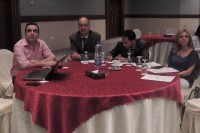 June the 26th in Amman.
June the 26th in Amman.
The Jordanian section of the NGO Master Plan for the Jordan River Basin identifies a set of feasible interventions that are expected to restore the basin’s environmental and ecological values within a realistic financial and economic framework. The interventions address the problems facing the Jordan Valley including solid waste management, sanitation, agriculture and farming practices. During the meeting, the interventions were evaluated to select the ones that meet future land and water requirements. Read more in this blog.
FoEME’s Regional NGO Master Plan (SWIM-JR) Project, is supported by the European Union’s Sustainable Water Integrated Management (SWIM) Programme.
———————————————————————————————————————————————————————————————————————–
EcoPeace / Friends of the Earth Middle East would like to wish all of our readers who are celebrating Ramadan, a month of health and happiness with your families. May the period of fasting allow deep contemplation and meaning to all.
———————————————————————————————————————————————————————————————————————–
 The Consultation Meeting was organized by adelphi and International Alert in cooperation with FoEME and was attended by representatives from the Jordan valley Authority, UNDP, Jordan University of Science and Technology “JUST”, Jordan Environment Society “JES”, Save the Children International in addition to several international donors including SIDA and DFID. The discussion focused on the effects of the Syrian refugees on Jordan, clashing Water cultures and tension resulting between hosts and refugees. In this respect, Ms. Haddaden pointed out that tension could be resolved if the poverty pockets in Jordan are not neglected by the international society in favor of the refugees. In an earlier site visit led by Ms. Haddaden to the Jordan Valley, she illustrated to the Consortium the various challenges that inhabitants of the valley face on a daily basis. These challenges are related to water distribution, agriculture, and lack of sewage network. The resultant of the site visit was a case study formulated as part of the report prepared for the G7.
The Consultation Meeting was organized by adelphi and International Alert in cooperation with FoEME and was attended by representatives from the Jordan valley Authority, UNDP, Jordan University of Science and Technology “JUST”, Jordan Environment Society “JES”, Save the Children International in addition to several international donors including SIDA and DFID. The discussion focused on the effects of the Syrian refugees on Jordan, clashing Water cultures and tension resulting between hosts and refugees. In this respect, Ms. Haddaden pointed out that tension could be resolved if the poverty pockets in Jordan are not neglected by the international society in favor of the refugees. In an earlier site visit led by Ms. Haddaden to the Jordan Valley, she illustrated to the Consortium the various challenges that inhabitants of the valley face on a daily basis. These challenges are related to water distribution, agriculture, and lack of sewage network. The resultant of the site visit was a case study formulated as part of the report prepared for the G7.















 community leaders in championing the rehabilitation of the Jordan River
community leaders in championing the rehabilitation of the Jordan River
















